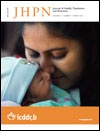IS6110 Restriction Fragment Length Polymorphism Typing of Drug-resistant Mycobacterium tuberculosis Strains from Northeast South Africa
DOI:
https://doi.org/10.3329/jhpn.v31i1.14743Keywords:
Drug resistance, Epidemiology, IS6110, M. tuberculosis, PCR-RFLP, South AfricaAbstract
Tuberculosis (TB) remains a deadly infectious disease affecting millions of people worldwide; 95% of TB cases, with 98% of death occur in developing countries. The situation in South Africa merits special attention. A total of 21,913 sputum specimens of suspected TB patients from three provinces of South Africa routinely submitted to the TB laboratory of Dr. George Mukhari (DGM) Hospital were assayed for Mycobacterium tuberculosis (MTB) growth and antibiotic susceptibility. The genetic diversity of 338 resistant strains were also studied. DNA isolated from the strains were restricted with Pvu II, transferred on to a nylon membrane and hybridized with a PCR-amplified horseradish peroxidase 245 bp IS6110 probe. Of the 338 resistant strains, 2.09% had less than 5 bands of IS6110, and 98% had 5 or more bands. Unique restriction fragment length polymorphism (RFLP) patterns were observed in 84.3% of the strains, showing their epidemiological independence, and 15.7% were grouped into 22 clusters. Thirty-two strains (61.5%) from the 52 that clustered were from Mpumalanga, 16/52 (30.8%) from Gauteng, and 4/52 (9.6%) from Limpopo province. Clustering was not associated with age. However, strains from male patients in Mpumalanga were more likely to be clustered than strains from male patients in Limpopo and/or Gauteng province. The minimum estimate for the proportion of resistant TB that was due to transmission is 9.06% (52-22=30/331). Our results indicate that transmission of drug-resistant strains may contribute substantially to the emergence of drug-resistant tuberculosis in South Africa.
J HEALTH POPUL NUTR 2013 Mar;31(1):1-10
Downloads
232
189

